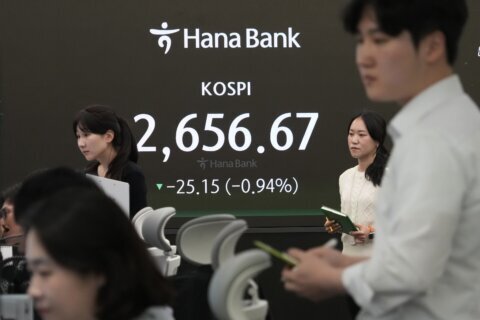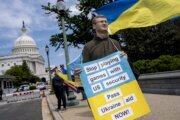BEIJING (AP) — China is showcasing economic development in its northwestern Xinjiang region to fight allegations of human rights abuses there.
The region’s government organized an international Zoom call featuring numerous testimonials from Muslim ethnic minorities native to Xinjiang. More than 1 million people have been held in a vast system of prison-like detention centers as part of a drive for cultural and political assimilation that the U.S. and some other Western governments have described as genocide.
China says the system is intended to deradicalize those influenced by jihadist ideology and teach job skills, and has fought accusations of human rights abuses by pointing to social stability and economic development in the vast region. In past years, hundreds were killed in attacks blamed on Islamist radicals, sparking a massive security clampdown.
The government has held near-weekly news conferences in Beijing and organized visits to Xinjiang by diplomats and journalists to counter accusations of political persecution, birth control imposed on Muslim women and forced labor, among other abuses.
Uyghurs and other minorities are generally seen as benefiting less from the region’s economic development than members of China’s dominant Han ethnic group who have flooded into the region over recent decades.
Wednesday’s Zoom call, which linked the regional capital of Urumqi with China’s mission to the United Nations in Geneva, Switzerland, showed how Beijing is stepping up its efforts to put its case before a global audience. Along with the testimonials and presentations by Chinese officials, foreign diplomats from allies such as Belarus and Pakistan also offered endorsements of Chinese policy.
China’s representative in Geneva, Chen Xu, repeated Beijing’s assertation that accusations over its Xinjiang policies were lies concocted to smear China’s image, obscure Xinjiang’s development and “attempt to restrain China’s developments.”
Such attempts are “doomed to failure,” Chen and other officials said during the call.
The new push comes days before a “people’s tribunal” is to open in Britain on allegations of genocide against Uyghurs and other Turkic Muslim people in Xinjiang.
The tribunal is expected to draw dozens of witnesses, although it has no government backing. China has denounced it as a “violation of international law and order.”
The hearings are to be chaired by prominent lawyer Geoffrey Nice, who led the prosecution of ex-Serbian President Slobodan Milosevic and worked with the International Criminal Court.
While the tribunal’s judgment is not binding on any government, organizers hope the process of publicly laying out evidence will compel international action on the alleged abuses.
Copyright © 2024 The Associated Press. All rights reserved. This material may not be published, broadcast, written or redistributed.






